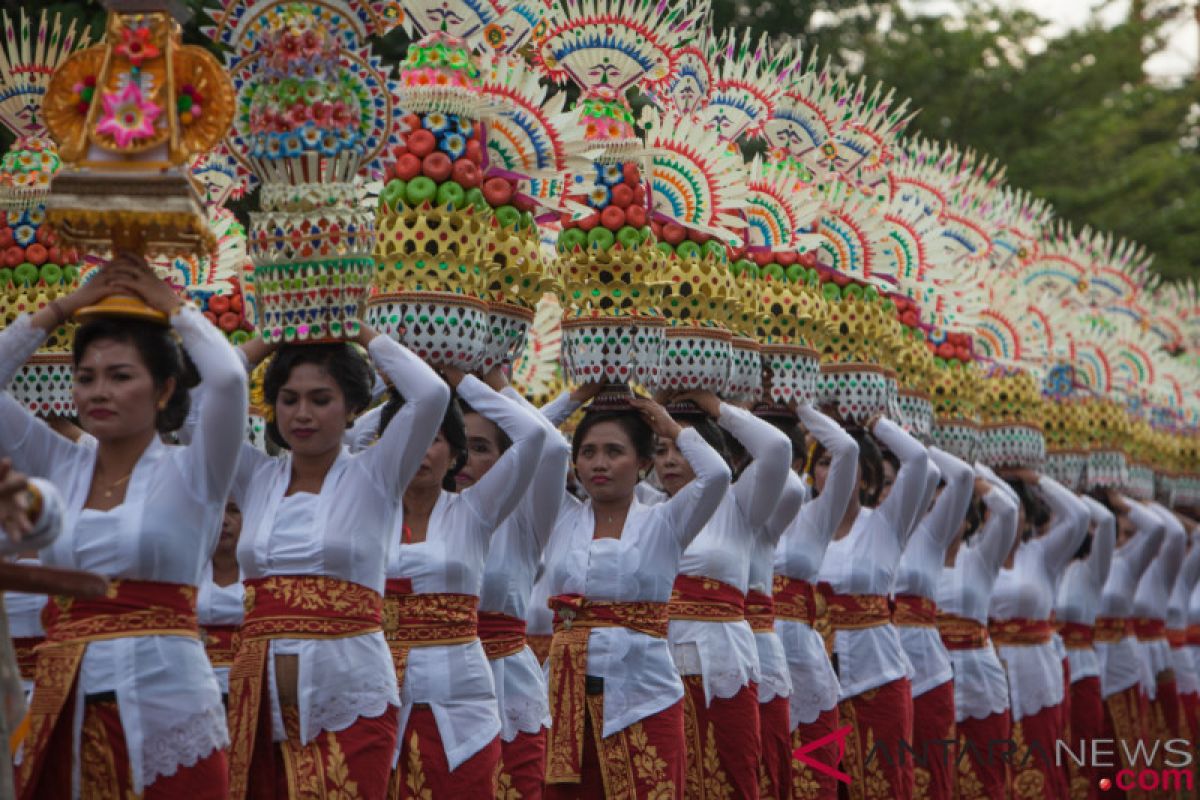The ensemble accompanied the Pecaruan or purification ritual to begin the parade, that described how the Bhuta Kala or evil spirit forces disturbing the tranquility of humans is treated to the offer of renewal and is then driven out by the troops of the gods to stay away and no longer bother humans.
The carnival organized by Bali provincial administration was held as part of the International Monetary Fund (IMF)-World Bank annual meetings held on October 8-14 in the resort island, to promote Balinese culture.
President Joko Widodo, accompanied by Tourism Ministry Arif Yahya and Bali Governor I Wayan Koster, officially started the carnival showcasing the cultural parade of the life and death of the Balinese people.
Bali Governor I Wayan Koster said at the opening of the carnival that the procession showcases the diversity, grandeur and majesty of Balinese culture, packaged in colossal performance works that are innovative, attractive and dynamic.
Themed "The Life and Economy of Bali", the carnival is aimed at conveying to the world that the Balinese life cycle rites (rites of passage) from birth to death are always accompanied by an instinct to fulfill their lives as virtuous and moral economic beings.
It described the majesty of Balinese culture, in addition to its beautiful nature and friendly people, valuable art and tradition, he said.
"Bali is also called as the Island of Gods, the Last Paradise, and the Island of Love," Koster said.
The Balinese life encourages the establishment of a building of civilization in a peaceful life-span.
"The harmonious life in Bali is based on the philosophy of Tri Hita Karana, namely the harmonious relations between humans and gods, humans with fellow humans and humans with the nature," he said.
The Bali Carnival comprised of Pecaruan (purification) Ritual, Dewa Yadnya ritual, Birth Rituals, Ritual of Raja Sewala, Tooth-cutting ritual, Marriage Rituals, and Death Ritual.
In Bali, the ceremony of respect and cleansing of nature and its environment was realized in the Bhuta Yadnya, one of which was in the procession of purification. There are five natural elements that are the targets of cleansing this ritual, namely land, water, air, fire and weather.
The Dewa Yadnya ritual is an offering to build harmony between human beings and gods in its various manifestations. The offering ceremony to the gods was addressed to the "Dewi Sri Sedana", believed to be a Goddess of Prosperity for Balinese Hindus.
The ritual of Otonan as part of the birth ritual is displayed when the baby is 210 days old, which is the anniversary of birth to say thanksgiving to the Almighty God for being born as human beings.
For Balinese, birth ritual is one special ceremony. "We believe that babies are reincarnation of the ancestors. I can say that my baby is a reincarnation of my grandmother for instance, because of similarities in her physical appearance or habits," a local car driver Ngurah Eka said.
However, all rituals are also considered important for the Balinese, he said, adding that each ritual could cost at least Rp10 million on the average though it could be adjusted with their budget.
In the ritual of Raja Sewala, the Hindu community members in Bali prepare the youth of their young generation as a reliable human resource for a reliable and supreme life.
The tooth-cutting ritual is aimed at minimizing the nature of bad human behavior, namely sensual indignation, greediness, cruelty and anger, confusion and arrogance, and envy and jealousy.
The parade continued with marriage rituals. For the Balinese Hindu community, pawiwahan or marriage is not only a happy event for a couple, but has an important meaning to be a human and a responsible citizen.
The parade ended with Ngaben, a death ritual which is held with full respect and sincerity by the Balinese people. The purpose of the Ngaben ceremony is that human body can return to its origin, the nature, and its spirit can be saved together with Sang Hyang Widhi Wasa (God).
This attraction is presented by dancing Bade and Naga Banda. This ngaben ritual is accompanied by Angklung and Balaganjur gamelan.
Editing by Rahmad Nasution
Reporter: Sri Haryati
Editor: Sri Haryati
Copyright © ANTARA 2018












